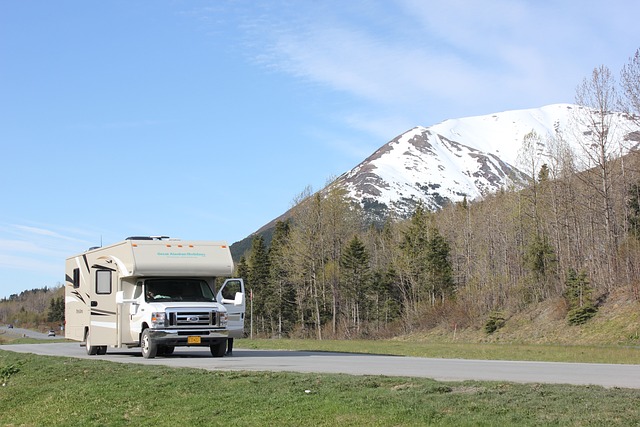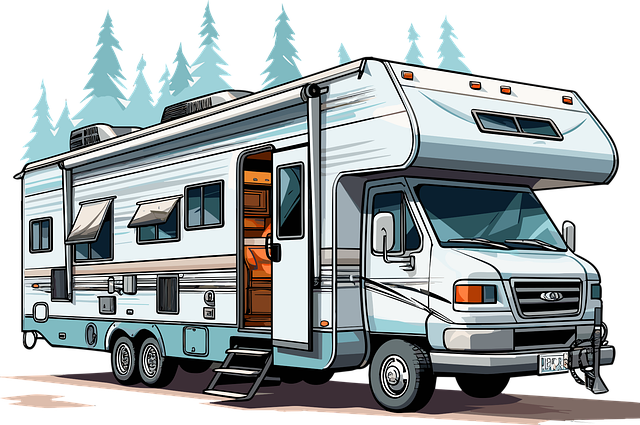For those new to RVing, making the right vehicle choice is key to enjoying a fulfilling RVing for Beginners experience. Consider your travel goals, comfort needs, and budget when selecting from various RV types like towable travel trailers, fifth wheels, Class B campervans, Class C 'mini-motos', or luxurious Class A motorhomes. Each type offers different features, sizes, and amenities to suit diverse lifestyles and preferences. Remember that the initial purchase is just the beginning; factor in ongoing costs such as fuel, maintenance, insurance, camping fees, and utilities. Ensure your tow vehicle is compatible with your RV, check local licensing requirements, and commit to regular maintenance to ensure safety and longevity on the road. With careful planning and consideration, RVing for Beginners can lead to a tailored, cost-effective, and enriching travel experience.
Embarking on the open road is a journey that beckons adventure, comfort, and freedom. For those new to RVing, selecting the right vehicle for your travels is pivotal. This article serves as a guide for RVers at any level, from novices to seasoned travelers, by breaking down the key aspects of RV types tailored to individual travel goals. We’ll explore diverse options from compact to luxury RVs, discuss the significance of size, amenities, and maneuverability, and provide practical advice on budgeting and legal considerations for your journey. Whether you dream of off-grid escapades or premium roadside living, the perfect RV awaits to transform your travel aspirations into reality.
- Understanding Your Travel Goals: How to Determine the Ideal RV Type for Your Adventures
- Classifying the Types of RVs: From Conventional to Luxurious – What's Available for RVers?
- The Nitty-Gritty: Size, Amenities, and Maneuverability in Different RV Models
- Budgeting for Your Journey: Cost Considerations When Selecting the Right RV
- Practical Considerations: Tow Vehicles, License Requirements, and Long-Term Maintenance
Understanding Your Travel Goals: How to Determine the Ideal RV Type for Your Adventures

Embarking on the journey of selecting the perfect RV type requires a clear understanding of your travel aspirations. For those new to RVing, the array of options can be overwhelming. RVing for Beginners involves considering various factors that align with your intended adventure. Whether you envision serene nights under the stars in a secluded forest or exploring bustling cityscapes, the ideal RV awaits to enhance your travel experience. Assess your comfort needs, storage preferences, and the types of destinations you plan to visit. For instance, if you’re drawn to off-grid exploration, a Class B campervan with its compact design and fuel efficiency might be your companion. On the other hand, if family adventures or long-term living on wheels are on the agenda, a spacious Class A motorhome could be more suitable, offering comforts comparable to a home. Understanding your travel goals is paramount; it dictates the size, amenities, and capabilities of the RV you’ll choose. By carefully evaluating your travel needs and preferences, RVing for Beginners becomes a smoother, more enjoyable journey tailored to your unique lifestyle.
Classifying the Types of RVs: From Conventional to Luxurious – What's Available for RVers?

Embarking on an RV journey offers a multitude of experiences, from the comforts of home to the adventure of the open road. For those new to RVing for Beginners, understanding the various types of recreational vehicles available is crucial to making an informed decision that aligns with your travel needs and preferences. RVs come in diverse configurations, each tailored to cater to different lifestyles and travel aspirations. The spectrum ranges from conventional travel trailers, which are towable by a variety of vehicles, to expansive Class A motorhomes that boast luxury amenities on wheels. In between, there are Class B and Class C motorhomes, each offering a balance between affordability, maneuverability, and comfort.
Travel trailers, often the entry point for RVers, can be as basic or as luxurious as one desires, with options to customize interiors to personal tastes. They provide the flexibility of detaching from the vehicle when exploring new destinations and offer a more cost-effective solution without sacrificing comfort. Moving up in size and features, fifth wheels are designed for extended stays, offering spacious living quarters, ample storage space, and sometimes even slide-outs to increase interior room. For those seeking the convenience of a motorized home on the road, Class B camper vans are perfect for solo travelers or couples who prioritize ease of driving and fuel efficiency, while still enjoying the essentials of RV living. Meanwhile, Class C motorhomes, often referred to as ‘mini-motos,’ offer a larger living space with sleeping accommodations above the cab and additional amenities that make them suitable for families or small groups. Lastly, Class A motorhomes are the epitome of luxury and comfort, resembling high-end hotels on wheels, complete with full kitchens, spacious bathrooms, and plenty of living space to unwind after a day of exploration. Each type of RV offers its own set of advantages, and choosing the right one depends on your travel style, budget, and the destinations you plan to visit while RVing for Beginners.
The Nitty-Gritty: Size, Amenities, and Maneuverability in Different RV Models

When embarking on your RVing journey, discerning the right type of recreational vehicle that aligns with your travel needs is paramount. Class A motorhomes are the heavyweights of the RV world, offering spacious interiors and luxurious amenities, often equipped with slide-outs to increase living space, making them ideal for full-time living or extended family trips. They boast a commanding presence on the road, complete with all the comforts of home, including full bathrooms, kitchens, and sometimes even fireplaces. However, their size requires careful consideration when navigating through smaller towns or tight spaces; they’re best suited for those who prioritize space over stealth on their travels.
Moving down the spectrum to Class B and C motorhomes, you’ll find more compact options. Class B campervans are perfect for RVing for Beginners due to their ease of handling and maneuverability. They’re akin to driving a large van but offer surprisingly efficient use of space with built-in amenities like bathrooms and kitchenettes. These vehicles are well-suited for couples or solo adventurers who value mobility and the ability to access remote or off-the-beaten-path locations. Class C motorhomes, often referred to as “mini” motorhomes, strike a balance between size and amenities, featuring over-cab sleeping areas and functional kitchens and bathrooms. They’re well-equipped for families or small groups looking to explore with the convenience of home comforts while still being nimble enough to navigate a variety of terrains and parking situations. Each RV type comes with its own set of advantages in terms of size, amenities, and maneuverability, so it’s crucial to assess your travel preferences and needs before making a selection that fits your RVing lifestyle.
Budgeting for Your Journey: Cost Considerations When Selecting the Right RV

Embarking on an RV journey presents a myriad of opportunities to explore and adventure, but it also involves careful financial planning. For those new to RVing for Beginners, understanding the cost implications is crucial for selecting the ideal RV that aligns with your travel budget. The initial investment in an RV varies widely, from compact travel trailers to expansive motorhomes. Factors such as size, amenities, age, and condition of the vehicle all influence the purchase price. Beyond the initial expense, consider the ongoing operational costs, including fuel, maintenance, insurance, campground fees, and utility expenses. It’s wise to create a detailed budget that accounts for these recurring expenditures. Fuel costs, for instance, can significantly impact your travel plans, so choose an RV that complements your driving preferences and intended travel distances. Regular maintenance is another critical financial consideration; larger coaches may require more substantial upkeep but could also offer the luxury and longevity suitable for long-term living. By carefully evaluating your budget and aligning it with the type of RV you select, you can ensure a more enjoyable and stress-free RVing experience tailored to your financial constraints and travel aspirations.
Practical Considerations: Tow Vehicles, License Requirements, and Long-Term Maintenance

When embarking on the RVing journey, understanding the practical considerations of tow vehicles, license requirements, and long-term maintenance is crucial for a seamless experience. Selecting the right tow vehicle is paramount; it must be capable of handling the weight and dimensions of your chosen RV type. The tow vehicle should complement your RV, ensuring stability and safety on the road. It’s advisable to consult vehicle manuals or seek professional advice to determine the appropriate tow vehicle for your specific RV model. Additionally, the towing capacity of your vehicle must exceed the weight of the RV you plan to pull. This ensures that you can safely manage the load, even with additional cargo or gear.
Moving beyond the initial selection, it’s imperative to acquaint yourself with the legal aspects of RVing for Beginners. Licensing requirements vary by state and country, so it’s essential to understand what is necessary in your area before you hit the road. In some regions, a standard driver’s license may suffice for towing smaller trailers, while larger rigs might demand a specialized Class B or Class A driver’s license. Be prepared to undergo additional training and testing if required. Long-term maintenance is another factor that cannot be overlooked. RVs, like any vehicle, require regular upkeep to maintain their performance and longevity. Familiarize yourself with the manufacturer’s recommended service schedule for your RV type, including checks on the engine, tires, brakes, and other vital components. Regular maintenance not only ensures safety but also helps prevent costly repairs down the line. By addressing these practical considerations early in your RVing journey, you’ll be better equipped to enjoy the open road with confidence and peace of mind.
Choosing the right RV type is a pivotal decision for those embarking on travel adventures. For RVing beginners, understanding one’s travel goals and the array of RV types available—from modest pop-ups to luxurious motorhomes—is crucial. This article has navigated through the different models, detailing their sizes, amenities, and maneuverability to suit diverse preferences and budgets. It has also shed light on practical considerations such as compatible tow vehicles, licensing requirements, and maintenance needs. By carefully weighing these factors, aspiring RVers can select an RV that not only aligns with their travel aspirations but also fits within their financial plan. With the right RV, the journey of discovery awaits, promising freedom, comfort, and the joy of exploration on the open road.
